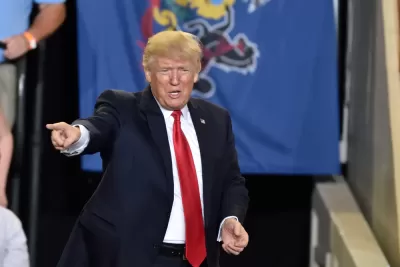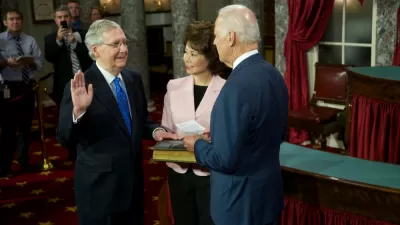President Trump will take his first trip abroad on Friday to Saudi Arabia, where he hopes to secure a $40 billion investment for his $1 trillion infrastructure plan. At home, Trump's plan was rebuffed by Texas legislators.

A report from Bloomberg News indicates that the Saudi kingdom's sovereign wealth fund, which is expected to grow to $2 trillion, "is set to announce plans to deploy as much as $40 billion into U.S. infrastructure, according to people familiar with the matter."
Keith Laing, formerly the transportation reporter for The Hill, reports for The Detroit News that taxpayers will fund $200 billion of Trump's infrastructure plan. According to Transportation Secretary Elaine Chao, the public funds would "be used to leverage $1 trillion in infrastructure investment over the next 10 years."
The remainder of the money would come from private companies that would enter into partnerships with local and state governments to provide financing that is necessary to complete expensive construction projects in exchange for revenue that would be generated by things such as road tolls or rail fares.
That public-private vision for infrastructure investment is not sitting well in Texas. "Wary of public opposition to new highway tolls, the Texas House voted on May 5 to reject a bill that would have allowed the partnerships, known as P3s, to participate in 18 highway projects costing as much as $30 billion," reports Mark Niquette for Bloomberg Politics.
The defeat leaves the second most-populous U.S. state unable to tap into the partnerships to finance the infrastructure improvements, even as Trump is proposing to expand their use.
Texas would not be the only state not being to take advantage of a Trump infrastructure plan contingent upon P3 deals. "Nationwide, 13 states have yet to adopt legislation authorizing some form of public-private partnership deals, according to Moody’s Investors Service," adds Niquette.
Hat tip to AASHTO Daily Transportation Update.
FULL STORY: Saudis to boost US ties with $40bn investment: Report

Maui's Vacation Rental Debate Turns Ugly
Verbal attacks, misinformation campaigns and fistfights plague a high-stakes debate to convert thousands of vacation rentals into long-term housing.

Planetizen Federal Action Tracker
A weekly monitor of how Trump’s orders and actions are impacting planners and planning in America.

In Urban Planning, AI Prompting Could be the New Design Thinking
Creativity has long been key to great urban design. What if we see AI as our new creative partner?

Cal Fire Chatbot Fails to Answer Basic Questions
An AI chatbot designed to provide information about wildfires can’t answer questions about evacuation orders, among other problems.

What Happens if Trump Kills Section 8?
The Trump admin aims to slash federal rental aid by nearly half and shift distribution to states. Experts warn this could spike homelessness and destabilize communities nationwide.

Sean Duffy Targets Rainbow Crosswalks in Road Safety Efforts
Despite evidence that colorful crosswalks actually improve intersection safety — and the lack of almost any crosswalks at all on the nation’s most dangerous arterial roads — U.S. Transportation Secretary Duffy is calling on states to remove them.
Urban Design for Planners 1: Software Tools
This six-course series explores essential urban design concepts using open source software and equips planners with the tools they need to participate fully in the urban design process.
Planning for Universal Design
Learn the tools for implementing Universal Design in planning regulations.
Appalachian Highlands Housing Partners
Gallatin County Department of Planning & Community Development
Heyer Gruel & Associates PA
Mpact (founded as Rail~Volution)
City of Camden Redevelopment Agency
City of Astoria
City of Portland
City of Laramie





























